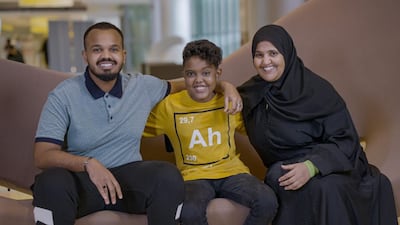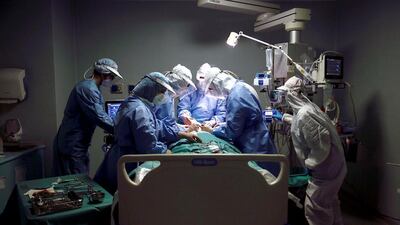A 14-year-old boy in Abu Dhabi got a new lease of life after his older brother donated a part of his liver in one of the most complex surgeries carried out in the emirate.
Montasir Taha received a part of his brother Khalifa's healthy liver during a living-donor liver transplant carried out at Cleveland Clinic Abu Dhabi.
The surgery involves removing a part of donor's liver and attaching it to receiver's damaged liver.
Because of the liver's ability to regenerate, the partial livers of both the donor and recipient grow within a few weeks into complete organs.
Montasir suffered from biliary atresia, a disease of the bile ducts that affects only infants.
This condition occurs when the bile ducts inside or outside the liver do not develop normally.
Montasir had to undergo the Kasai procedure when he was only 10 months old. The procedure connects a loop of small intestine directly to the liver so that the bile can drain into it.
Montasir's doctors in Sudan knew that it was only a matter of time before he would have to undergo a liver transplant, an inevitable treatment for most children who have this condition.
This year, Montasir’s symptoms and blood tests revealed that he was developing liver failure and was suffering from portal hypertension, an increase in the pressure within the vein that carries blood from the digestive organs to the liver, resulting in varicose veins in his oesophagus.
Seeing the high risk of potential complications, his doctors in Sudan recommended a liver transplant and he was brought to Abu Dhabi for the procedure.
Dr Luis Campos, the director of liver transplant and hepatobiliary at Cleveland Clinic Abu Dhabi, who was part of the team that cared for Montasir, said this was one of the most complex living-donor liver transplant surgeries that they have performed at the hospital.
“There were additional nuances that had to be taken into consideration because of his age, which made it even more challenging,” he said.
“Factors such as height and weight impact the surgery and after-care, and determine the dose of immunosuppressive medication during and after the transplant.
“There is also a risk of other infectious complications in paediatric liver transplant that do not apply to adult surgeries.”
Immunosuppressants medications are drugs that inhibit or prevent the activity of the immune system.
The medical team in Abu Dhabi studied the case and evaluated Montasir’s mother and brother for a match in February.
After careful discussion with colleagues in the US-based Cleveland Clinic, doctors here decided that his 23-year-old sibling would be a more suitable match.
“My little brother needed me," Khalifa said.
"I was very relieved when I was told that I can help be the cure to his illness.
"This was one of the easiest decisions that I have had to make. My father died six months back and as the eldest son in the family, it was my responsibility to save him."
Dr Shiva Kumar, the chair of gastroenterology and hepatology in the Digestive Disease Institute at the hospital, said performing the Kasai procedure on Montasir was challenging.
“While the Kasai procedure is commonly performed to prolong the need for a liver transplant in children, this is a major operation and makes the transplant more challenging to perform,” he said.
“However, the surgeries of both brothers were successful and without complications.
“Montasir received a left lobe graft from his brother. This is a smaller portion of the liver than if we were transplanting a right lobe graft. This makes it a safer operation for the donor and helps them recover faster.”
The brothers are on their way to a full recovery. Khalifa is back to his normal life now while doctors are monitoring Montasir's immunosuppressive regimen, which he will have to continue for the rest of his life.
Khalifa said he was overjoyed when he was told that the surgery was a success.
“The best part of my transplant journey was to see that Montasir’s body had accepted the new organ. My family and I are very grateful to the doctors for saving my brother’s life,” he said.
Khalifa hopes that more people consider organ donation.
“The feeling of giving a chance to someone to live a normal life is incomparable," he said.
"Seeing the result of your donation will fill you with contentment."















